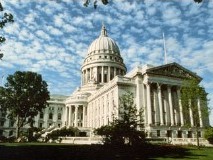A bipartisan group of lawmakers is circulating legislation for co-sponsorship to expand a tax exclusion for investors in “opportunity zones” throughout the state.
The bill would double the tax exclusion for those who invest in qualified opportunity zones, which draw investment to low-income rural and urban areas.
Investors in funds for these areas get incentives including tax deferral on invested capital gains, and tax-free growth on investment earnings in the related opportunity fund. The investors receive a 10 percent reduction in the original gains tax if the investment is held for at least five years, and a 15 percent reduction after seven years. If the bill were made law, those reductions would be doubled, according to the co-sponsorship memo.
The bill’s authors say the change would encourage Wisconsin investors to keep their money in the state, bringing more private capital to “economically challenged areas of the state and accelerating economic growth and job creation across the board.”
The bill’s sponsors include Reps. Nancy VanderMeer, R-Tomah, and Jill Billings, D-La Crosse; as well as Sens. Dan Feyen, R-Fond du Lac, and Janice Ringhand, D-Evansville.
The memo shows the opportunity zones community development program was established by national legislators in 2017, aimed at boosting long-term investments in low-income areas. Eligibility for these zones is based on community census tracts, funneling investment in the country’s “most economically challenged communities.”
Lawmakers in the state incorporated the federal opportunity zone tax provisions into state law last session, applying the tax benefits to state income taxes. These zones are designated by the U.S. Treasury secretary and input from state governors. Wisconsin currently has 120 designated opportunity zones.
Individuals can invest in opportunity zones by putting money into a qualified fund that’s required to hold at least 90 percent of its assets in opportunity zone properties. If the fund’s opportunity zone assets fall below the 90 percent threshold, the fund is fined based on how much it’s fallen short.
Under the federal program, the investor defers paying taxes on capital gains until Dec. 31, 2026, or until the investor sells the investment in the fund. The investor may then permanently exclude 10 percent of the deferred gains from income, avoiding taxes on that amount if the investment was held for at least five years. That exclusion is 15 percent if the investment was held for at least seven years. And if the investor holds the investment for at least a decade, the investment’s earnings aren’t taxed.
The deadline for co-sponsorship is 5 p.m. Friday.
See more on Wisconsin’s opportunity zones: http://www.wheda.com/Opportunity-Zones/






